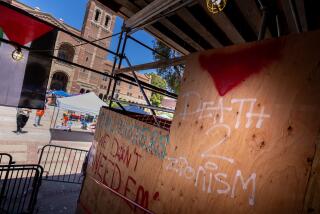Ongoing Iraqi Camp Questioned
WASHINGTON — WASHINGTON -- Secretary of State Colin L. Powell spent a significant part of his presentation to the United Nations this week describing a terrorist camp in northern Iraq where Al Qaeda affiliates are said to be training to carry out attacks with explosives and poisons.
But neither Powell nor other administration officials answered the question: What is the United States doing about it?
Lawmakers who have attended classified briefings on the camp say that they have been stymied for months in their efforts to get an explanation for why the United States has not launched a military strike on the compound near the village of Khurmal. Powell cited its ongoing operation as one of the key reasons for suspecting ties between Baghdad and the Al Qaeda terror network.
The lawmakers put new pressure on the Bush administration to explain its decision to leave the facility, which it has known about for months, unharmed.
“Why have we not taken it out?” Sen. Joseph R. Biden Jr. (D-Del.) asked Powell during a Senate Foreign Relations Committee hearing Thursday. “Why have we let it sit there if it’s such a dangerous plant producing these toxins?”
Powell declined to answer, saying he could not discuss the matter in open session.
“I can assure you that it is a place that has been very much in our minds. And we have been tracing individuals who have gone in there and come out of there,” Powell said.
Absent an explanation from the White House, some officials suggested that the administration has refrained from striking the compound in part to preserve a key piece of its case against Iraq.
“This is it, this is their compelling evidence for use of force,” said one intelligence official, who asked not to be identified. “If you take it out, you can’t use it as justification for war.”
Sen. Dianne Feinstein (D-Calif.), a member of the intelligence committee, said she and other members have been frustrated in their attempts to get an explanation from administration officials in closed-door briefings.
“We’ve been asking this question and have not been given an answer,” Feinstein said. Officials have replied that “they’ll have to get back to us.”
A White House spokesman said Thursday he had no comment on the matter.
The administration’s handling of the issue has emerged as one of the more curious recent elements of the war on terrorism. Failing to intervene appears to be at odds with President Bush’s stated policy of preempting terrorist threats, and the facility is in an area where the United States already has a considerable presence.
U.S. intelligence agents are said to be operating among the Kurdish population nearby, and U.S. and British warplanes patrol much of northern Iraq as part of their enforcement of a “no-fly” zone.
Several lawmakers and intelligence experts expressed concern that Powell’s presentation Wednesday might have cost the United States an opportunity to prevent the spread of toxins.
“By revealing the existence of the camp, it’s predictable whatever activity is there will probably go underground,” said Rep. Jane Harman (D-Venice), the ranking Democrat on the House Intelligence Committee. “I don’t understand why we don’t hit it,” said Robert Baer, a former CIA officer who worked extensively in northern Iraq. U.S. officials said the Pentagon and the CIA considered plans last summer for a covert raid on the compound, but that administration officials decided against pursuing the plan.
Officials would not say why the plan was scrapped but rejected reports at the time that activity at the camp was not seen as significant enough to warrant the risks.
Sen. Carl Levin (D-Mich.), ranking Democrat on the Senate Armed Services Committee, is particularly vocal on the matter.
“I favor prompt and forceful U.S. military action to deal with that problem, as we have done in attacking Al Qaeda terrorists in Afghanistan and Yemen,” Levin said in a statement. A satellite photo showed by Powell depicted a collection of elongated buildings on relatively bare terrain, a seemingly easy target for U.S. warplanes or missiles fired from a Predator drone.
Some suggested that bombing the facility could complicate diplomatic efforts to build international support for a possible war with Iraq.
The camp is outside the “no-fly” zone, but lawmakers said based on Powell’s remarks, the United States would seem to have ample justification for an attack under international law.
“It’s clear to me there is existing authority,” Feinstein said.
Several lawmakers cited the U.S. strike last November in Yemen, when a CIA Predator fired a Hellfire missile at a carful of suspected Al Qaeda operatives, killing six, including a U.S. citizen.
In his U.N. presentation, Powell portrayed the camp as an international menace, a facility where terrorists learn how to work with explosives and a deadly toxin known as ricin.
“Less than a pinch,” Powell said, “would cause shock, followed by circulatory failure. Death comes within 72 hours and there is no antidote.”
The facility is in a corner of Iraq controlled by an Islamic extremist group known as Ansar al-Islam, which is believed to have Al Qaeda ties.
But Powell said the camp is run by lieutenants of terrorist suspect Abu Musab Zarqawi, a 36-year-old Palestinian linked to a series of plots in Europe, and the killing of a U.S. Embassy worker in Jordan last year.
Zarqawi is seen as a possible link between Baghdad and Al Qaeda. Zarqawi was treated at a Baghdad hospital last year for a wound he suffered in Afghanistan, the United States says.
British police recently broke up a plot involving the possible poisoning of food at a British military base. A U.S. official said Thursday that traces of ricin were found in an apartment where several Islamic extremists were arrested. The official said those detained appear to have links to Zarqawi and the camp.
*
Staff writer Robin Wright contributed to this report.
More to Read
Sign up for Essential California
The most important California stories and recommendations in your inbox every morning.
You may occasionally receive promotional content from the Los Angeles Times.










